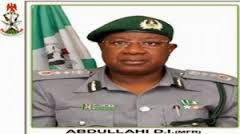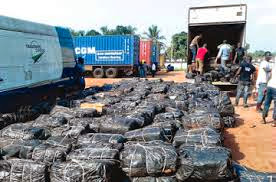We have amended our Terms of Use:
Please read about the new changes
close
Last edited 10 months ago by Chris the speller
Nigerian Customs Service
The Nigerian Customs Service (NCS) is an independent agency under the supervisory oversight of the Nigerian Ministry of Finance, responsible for the collection of customs revenue collection and anti-smuggling efforts.
Contents
History
Structure
Reputation
Reform Attempts
References
External links
HistoryEdit
The NSC was founded in 1891 when the former British Colonial administration appointed T. A. Wall as Director-General of Customs for the collection of Inland Revenue in Niger Coast Protectorate. This became the Department of Customs and Excise in 1922, managed by the Comptroller of Customs and Excise, Federation of Nigeria.[1]
By 1945, the Customs and Excise Preventive service had been established, divided into two arms – Maritime and Preventive. The Maritime unit was responsible for the collection of revenues from import and export duty, while the Preventive arm was tasked with the prevention of smuggling, as well as the arrest and prosecution of smugglers.
The Customs and Excise Management Act (CEMA) No. 55 of 1958 saw the introduction of a management board to the unit and the appointment of its first chairman and chief executive officer (CEO), E. P. C. Langdon. He was succeeded by S. G. Quinton.
In 1964, the first Nigerian CEO, Ayodele Diyan, was appointed, following Nigerian independence in 1960.[1]
A change in legislation in 1970 saw the introduction of new board members representing the Federal Ministries of Economic Development and Reconstruction, Trade and Industries. When the government changed hands in 1975, the board members were retired and the role of chairman and CEO was abolished and replaced by the position of director.
Alhaji Shehu A. Musa was appointed as the first director with a mandate to re-organise the structure of the board. Musa’s core proposal was to unify what had been operating as two separate, parallel services. The government believed that the distinction between revenue collection and preventive services was causing administrative difficulties.[1]
In 1978, the units were merged into the unified Department of Customs and Excise. The integrated service allowed officers to work in both revenue and preventative roles, reporting to one of five directorates:
Customs Tariff and Trade;
Customs Enforcement Directorate;
Customs Investigation Directorate;
Customs Inspection Directorate;
Customs Economic relations, Research; and Planning Directorate.[1]
In 1985, the unit was moved from under the governance of the Ministry of Finance to the Ministry of Internal Affairs and renamed the Customs, Immigration and Prisons Services Board. The functioning of the unit was also decentralised so that each state was run by area controllers.
By 1992, the department was returned to the Ministry of Finance and recognised as a para-military organisation. A sole administrator was appointed to conduct a probe into the operations of the customs board. It was also renamed the Nigerian Customs Service (NSC), the name by which it is still recognised today.
When Sani Abacha took power in 1993, he set up a probe into the NCS, which was led by Major-General Paul Tarfa. The panel charged with investigating the activities of the NCS was given a year in which to complete its findings and a sole administrator was appointed in the meantime. Brigadier-General S.O.G. Ango remained as head of the NCS until 1999, when he was replaced by Ahmed Aliyu Mustapha.[1]
At the same time as Mustapha was appointed, a new board was formed, headed by the minister of finance. Mustapha, as comptroller-general, was supported by six deputy comptrollers-generals, covering the following departments:
Finance, Administration and Technical Services;
Tariff and Trade;
Excise and industrial incentives;
Enforcement and drugs;
Economic Relating Research and planning;
Investigation and Inspection.
The zonal structure employed under the Abacha government was also retained.
This system remained in place until late 2003, when Mustapha retired. A restructuring committee was established, led by the minister of finance, which saw sweeping reforms including the retirement of 75 officers and the reformatting of the department into three departments and four zones, covering 25 area commands.[1]
StructureEdit
Today, the NCS is still run by the comptroller general, who oversees the work of five deputy comptroller generals in the following departments:
Corporate Support Services;
Tariff & Trade;
Enforcement, Investigation, and Inspection;
Modernization, Research and Economic Relations;
Human Resource Development.[2]
The NCS board is chaired by the minister of finance, while the vice-chairman is Abdullahi Dikko Inde, the service’s comptroller general.
Dikko Inde was born in Katsina state and holds a degree in economics and a master’s degree in finance from the University of Dimitrov Apostle Tshenov in Bulgaria. He previously worked at the Kaduna state audit and is also a member of the Certified National Accountants and National Institute of Management.[3]
Dikko Inde has a largely positive reputation, having risen through the ranks of the NCS since entering it at superintendent level in 1988 and rising to become the organisations premier officer. He is recognised as having a “distaste” for injustice and giving junior officers their due, regardless of how small a contribution they have made. His appointment as head of the NCS was seen by some within the institution as a last-ditch attempt to clear up the image of the unit in which he is known as “Mr Welfare.”[4]
ReputationEdit
The service’s reputation has been marred by numerous corruption and fraud scandals across the years. According to Transparency International’s 2010 Global Corruption Barometer, more than half of local households surveyed attested to paying bribes to NCS officers in 2009.[5]
To date, complex customs regulations and bureaucracy surrounding the import and export of goods has nurtured an environment in which bribes are commonly paid. Several companies are also believed to undervalue their goods upon importation to avoid penalties. Yet other companies, operating in the informal economy, resort to smuggling as a means of avoiding legal trade.
Notably, a number of foreign companies have been involved in fraud and corruption scandals in recent years:
Three subsidiaries of Vetco International – Vetco Gray Controls Inc, Vetco Gray Controls Ltd and Vetco Gray UK Ltd – pleaded guilty to violating anti-bribery provisions of the Foreign Corrupt Practices Act (FCPA) when they admitted to making US$2.1 million worth of corrupt payments over a two-year period to officers in the NCS through Panalpina, a Swiss-based freight forwarding firm in Nigeria.[6]
At the same time as the subsidiaries were charged, another Vetco subsidiary – Aibel International Ltd – entered into a deferred prosecution agreement with the US Department of Justice for its involvement in the same scandal. This deferred prosecution agreement entailed co-operation with the Department of Justice, stricter controls and the retention of FCPA monitors. Subsequently, however, the company admitted to failing to comply with its obligations and paid a monetary fine.[7]
Oil services firm Transocean Ltd made corrupt payments to the value of US$90,000 to Nigerian customs officials between 2002 and 2007 to extend its importation status and receive false paperwork.[8]
Tidewater Inc., an oil service firm, paid US$1.6 million through Panalpina to Nigerian customs officials to clear vessels into Nigerian waters.[9]
Noble Energy authorised payments by its local subsidiary to obtain eight temporary permits. In November 2011, Noble, Transocean and Tidewater were three of the companies that settled allegations of involvement in a US$100 million bribery scheme in Nigeria, as part of the Panalpina settlements.[8]
Royal Dutch Shell entered into a U.S. plea deal in November 2010 over its contractor's involvement in bribing Nigerian customs officials. US authorities accused Shell’s subsidiary Shell Nigerian Exploration and Production Co Ltd. of bribing Nigerian customs officials US$3.5 million to quickly process needed equipment for its offshore Bonga field. A heavy fine was levied on Shell after Panalpina, which was also employed by Shell, agreed to plead guilty to taking bribes on behalf of its clients.[10]
Outside of FCPA litigation, there are several examples of everyday Nigerian businessmen being urged to pay bribes to customs officials in order to smooth the passage of their goods.[11][12]
Reform AttemptsEdit
The current comptroller-general has been driving a reform programme endorsed by President Goodluck Jonathan that will see the NCS conform to global best practice.[13]
Dikko Inde publicly stated at a training seminar “We pledge to be steadfast, committed and resolute in this fight no matter how overwhelming the challenges may appear.”[14]
His efforts appear to be taking effect. The unit secured its revenue target for 2011, seen in part to be as a result of an increase in transparency. In addition, 14 officers have also been suspended and their salaries stopped for their involvement in corrupt dealings.[15]
ReferencesEdit
Nigeria Customs Service. "Brief History of NCS". Nigeria Customs Service.
Nigeria Customs Service. "Organisation Structure". Nigeria Customs Service.
Danladi Boyi (16 August 2009). "Customs: Enter Dikko Abdullahi". The Nation.
AUTHOR (7 February 2011). "Profiling ‘Mr. Welfare’, Abdullahi Dikko Inde". Emmanuel Y. Kwache.
BUSINESS ANTI-CORRUPTION PORTAL. "Country Profile". BUSINESS ANTI-CORRUPTION PORTAL.
U.S. Department of Justice (6 February). "Three Vetco International Ltd. Subsidiaries Plead Guilty to Foreign Bribery and Agree to Pay $26 Million in Criminal Fines". PR Newswire.
European Anti-Bribery Blog (23 November 2008). "Aibel Group Limited pleads guilty in the US second time around". European Anti-Bribery Blog.
Samuel Rubenfeld (13 January 2011). "Nigeria Arrests 12 Oil Executives Over Alleged Bribery". Wall Street Journal.
FCPA Blog (10 November 2011). "SEC Posts Cases Eligible For Whistleblower Rewards". FCPA Blog.
Rowena Mason and Richard Blackden (4 November 2010). "Shell to pay $48m Nigerian bribe fine". Telegraph.
Peoples Daily (4 November 2011). / "How corrupt officials skim government at the ports". Peoples Daily.
Babs Ajayi (27 May 2011). "END OF OYO BUFFOONERY BUT FLAGRANT CORRUPTION CONSUMES NIGERIAN CUSTOMS". NigeriaWorld.
Nigeria First (19 January 2012). "National Security & Intelligence". Nigeria First.
EZEKIEL TITUS (DATE). "Customs boss vows to fight corruption". National Mirror.
Isa Sa’idu, Kaduna Saturday (31 December 2011). "‘Fight against corruption stabilizing Customs’". Weekly Trust.
External linksEdit
Official website
Wikipedia ®
Mobile
Desktop
Content is available under CC BY-SA 3.0 unless otherwise noted.
Privacy
563556379.jpeg)









563556379.jpeg)
